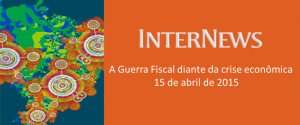He is on the Constitution, Justice and Citizenship Commission (CCJ), awaiting the appointment of rapporteur, the Proposed Amendment to the Constitution (PEC) 154/2015, by Walter Pinheiro (PT-BA), which allocates part of what is collected through the repatriation of resources for the creation of the National Fund for Regional Development (FNDR). The proposal also creates a compensatory fund for the states, with a duration of eight years, aiming at the unification of the rates of the Tax on Circulation of Goods and Services (ICMS).
The government seeks through the Special Regime for Foreign Exchange and Tax Regularization, to be created after the approval of the Bill of Law of the Chamber (PLC) 186/2015, make possible sources of funds with the application of income tax and fine on assets and assets of lawful origin kept abroad that are regularized with the IRS.
According to PEC 154/2015, the Regional Development Fund should receive, from this and other sources, at least R $ 3 billion per year, during the first five years. To the ICMS convergence aid fund, R $ 1,5 billion should be allocated annually in its eight years of effectiveness. Still according to the proposal, the FNDR should prioritize the Northeast, Midwest and North regions, with the Northeast receiving 50% of the resources.
The ICMS convergence aid fund will allocate its resources in proportion to the losses recorded in each state. If the eight-year term is over and there are still losses, the fund should be extended for another two years.
STF Summary
Pinheiro recalls that the Supreme Federal Court (STF) can vote at any time on the Súmula Vinculante 69, which makes all tax incentives granted since the 1990s unconstitutional, such as those dealing with the ICMS.
- If this occurs, there will be unpredictable economic and social consequences for several states, such as the cancellation of scheduled investments, the closure of production units and the increase in unemployment - he warns.
The senator believes that this is a fundamental complementary measure related to the reform of the ICMS interstate tax system, which is already being debated in the Senate through the
PRS 1/2013.
Source: Agência Câmara (7/12)





